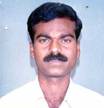
Hello Life
Improving the lives of people worldwide
|
|
Hello Life Improving the lives of people worldwide |
|
|
Yallappa Irakkal Making Education and Health a Reality for all
Click here to read HelloLife.org's Spotlight January 2003: An interview with Yallappa Irakkal
The nine years he put into developmental work with Ujwala, an NGO in North Karnataka, India, made Yallappa conscious of the trials and tribulations of the Lambani community in the area. Ujwala works towards prevention and elimination of child labour and empowerment of women. The organization encouraged the 34-year old Yallappa Irakkal to embark on his own to strive towards the uplift of the Lambanis in the Bijapur district of Karnataka.
The Lambanis are a migrant community. They travel to neighboring villages during the harvest season to work in the fields of landowners on a contract basis. The rest of the year, for almost six months, they move to the cities to work as construction laborers. This constant migration displaces the children from schools, and they too are often found helping their parents in the fields or at the construction sites.
Yallappa approached Child Relief and You (CRY) and became a Fellow under the Rippan Kapur CRY Fellowship in the year 2000. He planned his development activities around four villages in Gadag district of Karnataka, which is populated mainly by the Lambani community. Approximately 450 families live in these villages. Among the 802 children in the age group of 6-14 years, 87 were found to be non-school going. The objective of Yallappa’s initiatives in this area was to put a stop to child labor and enroll these working children into schools. This would be facilitated through non-formal education centers (transit schools) and Anganwadis (pre-primary schools).
The village surroundings were not very hygienic, and the doctors and health workers assigned to the villages seldom visited the schools. The children suffered from malnutrition. People’s ignorance also played a large role in this dismal situation. The community had to be made aware of the importance of education and the need for an alternative source of income that would prevent them from leading a nomadic life.
Yallappa reactivated the government-run Anganwadis that had become defunct in two of the villages, and the teachers at these centers were counseled to take interest in the attendance and health of their students. He initiated the School Development and Monitoring Committee (SDMC) in all four villages. This committee helped in keeping track of and monitoring the attendance of the teachers and the students at the local government schools.
Self Help Groups were formed within the village community, and their members were mobilized to take decisions for the benefit of the village on behalf of the community. Teachers were roped in along with members of the Self Help Groups and some youth volunteers to participate in the enrollment campaign for the children. Children who had dropped out during the year were readmitted to schools, and parents were counseled to send their children back to school to continue their education. About 27 children have since been placed back into schools and their attendance has been ensured by regular follow-up at the school as well as with their families.
"At the Bal Bhavan in Bangalore (the capital of Karnataka) on Children's Day, these children participated in the program and personally read out the request letter to the Governor of Karnataka. This was a tremendous achievement for them and a proud day for me,” says Yallappa.
Yallappa also coordinated and organized polio and vaccination camps with the help of the Self Help Group members. He met the local health workers and convinced them to visit the villages more often. The village women were made aware of health and hygiene matters and urged to go in for regular health check ups, both for themselves and for their children. Yallappa mobilized the women to take an interest in and actively participate in the development of their villages. “I strongly believe that women can be a key factor in changing the prevalent situation in villages”, says Yallappa.
However, migration of some of the Lambani families still continues. Convincing them to continue to send their children to school to study instead of taking them along whenever they move has been an uphill task.
Over the past two years, Yallappa’s interventions have not resolved all the problems and issues faced by the Lambanis, but they have definitely brought about awareness among them on their right to seek necessary infrastructure and facilities from the concerned authorities. The villagers have also realized the importance of education and healthcare for a better life for their children.
Yallappa continues in his endeavors to make education a reality for all.
Start today, become a Helping Hand Yourself!
Click here to make a donation through CRY to help Yallappa help children. Please mention that your donation is for Yallappa’s work on health and education for the Lambanis, and it will be considered as part of CRY’s “Adopt a Project Scheme”. Yallappa may be contacted via CRY at:
Mr. Yallappa G Irakkal c/o Child Relief and You Madhavai Mansion, 12/3-, Bachammal Road Cox Town, Bangalore - 560005 email: comm.blr@crymail.org
|